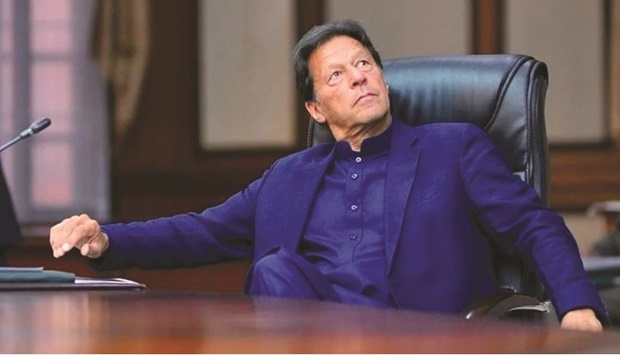Imran Khan, a cricket legend who embarked on a long and difficult journey in politics to become prime minister, rallied his citizens with a vision of a corruption-free, prosperous country respected on the world stage.
To his critics, however, the firebrand nationalist was too much under the thumb of the powerful military — which has ruled the country for half of its history since independence in 1947.
Handsome and charismatic, Khan first grabbed the world’s attention in the early 70s as an aggressive fast-paced bowler with a distinctive leaping action.
He went on to become one of the world’s best all-rounders, and captained a team of wayward stars from bleak prospects to Pakistan’s first and only World Cup win in 1992, urging on them with the famed battle cry to fight “like cornered tigers”.
After retiring from cricket that year, he became known as a philanthropist, raising $25mn to open a cancer hospital in memory of his mother, before foraying into politics with the establishment of his Tehreek-i-Insaf (PTI), or Pakistan Movement for Justice party, in 1996.
Despite his fame, the PTI languished in Pakistan’s political wilderness, not winning a seat other than Khan’s for 17 years. This period had its dramatic moments, however, with Khan in 2007 escaping house arrest by leaping over a wall amid a crackdown on opposition figures by then military ruler General Pervez Musharraf.
In 2011, Khan began drawing huge crowds of young Pakistanis disillusioned with endemic corruption, chronic electricity shortages and crises in education and unemployment.
He drew even greater backing in the ensuing years with well-educated Pakistani expatriates leaving their jobs to work for his party and pop musicians and actors joining him on the campaign trail.
His goal, Khan told a gathering of hundreds of thousands of supporters in 2018, was to turn Pakistan from a country with a “small group of wealthy and a sea of poor” into an “example for a humane system, a just system, for the world, of what an Islamic welfare state is”.
That year, after 22 years in politics, he was at long last victorious, marking a rare ascension by a sporting hero to head of state. Observers cautioned, however, that his biggest enemy was his own rhetoric having raised his supporters’ hopes sky high.
Born in 1952, the son of a civil engineer, Imran Ahmed Khan Niazi described himself as a shy kid who grew up with four sisters in an affluent urban Pashtun family in Lahore, Pakistan’s second-biggest city.
After a privileged education in Lahore, during which his cricketing skills became evident, he went on to the University of Oxford where he graduated with a degree in Philosophy, Politics, and Economics.
As his cricket career flourished, he developed a playboy reputation in London in the late 1970s. In 1995, he married Jemima Goldsmith, daughter of business tycoon James Goldsmith. The couple, who had two sons together, divorced in 2004. A second brief marriage to TV journalist Reham Khan also ended in divorce.
His third marriage to Bushra Bibi, a spiritual leader whom Khan had come to know during his visits to a 13th century shrine in Pakistan, reflected his deepening interest in Sufism — a form of Islamic practice that emphasises spiritual closeness to God.
Once in power, Khan embarked on his plan of building a “welfare” state modelled on what he said was an ideal system dating back to the heyday of Islam, some 14 centuries earlier.
His government made a number of key appointments based on qualifications and not political favours and sought to reform hiring in the bureaucracy and civil service.
Other measures included making it easier for citizens to lodge complaints and the introduction of universal healthcare for the poor in one province with plans to expand the programme nationally. The government also began a project to plant 10bn trees to reverse decades of deforestation.
To bolster a long-crippled economy, Khan made a significant u-turn in policy and secured an IMF bailout for Pakistan and set lofty, albeit unmet goals, to expand tax collection.
But his anti-corruption drive was also heavily criticised as a tool for sidelining political opponents — many of whom were imprisoned on charges of graft.
Pakistan’s generals remained extremely powerful and military officers were placed in charge of more than a dozen civilian institutions, including Pakistan’s flagship Belt and Road initiative with China, a national taskforce to combat Covid-19 and the Civil Aviation Authority.

HOUR OF RECKONING: Prime Minister Imran Khan is facing a no-trust vote.
